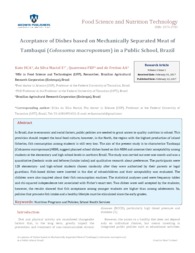Acceptance of dishes based on mechanically separated meat of tambaqui (Colossoma macropomum) in a public school, Brazil.
Acceptance of dishes based on mechanically separated meat of tambaqui (Colossoma macropomum) in a public school, Brazil.
Author(s): ALMEIDA, H. C. G.; MACIEL, E. da S.; QUARESMA, F. R. P.; FREITAS, A. A.
Summary: In Brazil, due to economic and social factors, public policies are needed to grant access to quality nutrition in school. This provision should respect the local food culture; however, in the North, the region with the highest production of inland fisheries, fish consumption among students is still very low. The aim of the present study is to characterize Tambaqui (Colossoma macropomum) MSM, suggest planned school dishes based on this MSM and assesses their acceptability among students at the elementary and high school levels in northern Brazil. The study was carried out over one month and was a quantitative (hedonic scale and leftover/intake index) and qualitative research about preference. The participants were 120 elementary- and high-school students chosen randomly after they were authorized by their parents or legal guardians. Fish-based dishes were inserted in the diet of schoolchildren and their acceptability was evaluated. The children were also inquired about their fish consumption routines. The statistical analyses used were frequency tables and chi-squared independence test associated with Fisher?s exact test. Two dishes were well accepted by the students; however, the results showed that fish acceptance among younger students are higher than among adolescents. So, policies that promote fish intake and a healthy lifestyle must be stimulated since the early grades.
Publication year: 2017
Types of publication: Journal article
Observation
Some of Embrapa's publications are published as ePub files. To read them, use or download one of the following free software options to your computer or mobile device. Android: Google Play Books; IOS: iBooks; Windows and Linux: Calibre.
Access other publications
Access the Agricultural Research Database (BDPA) to consult Embrapa's full library collection and records.
Visit Embrapa Bookstore to purchase books and other publications sold by Embrapa.

